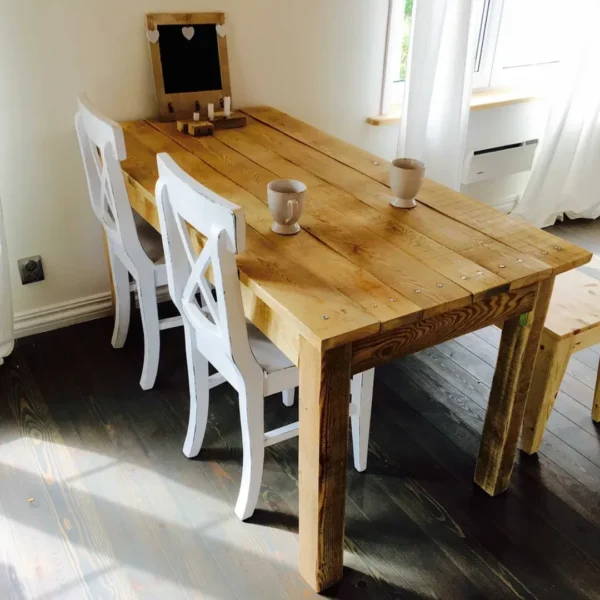
3 min. read

11 min. read
“In my free time, I like to make furniture. Wood is my material. I understand it as a craft. I also like working with leather, and cooking,” says Jakub, Head of Strategy & Data at Motors Europe at OLX.
“When you work with data, there’s no tangible material. It’s on the screen of a computer. So, it’s interesting that all of my hobbies center around tangible things. When you do something with your hands, you get it on a physical level. You can touch it. You see the fruits of your labor right away. I do see the connection between my work and my hobbies, though. In both, I’m creating — whether it’s physical or digital.”



In both his professional and personal endeavors, Jakub has always focused on building things. It’s what fuels him to push ahead.
“I’m an explorer type. For me, work is like a journey. Within OLX, I was changing my role every two or three years. It gives me energy. I like to do versus sustain, and I’ll always go somewhere where I can build and create. Building gives me energy and I share it with the team.”
That passion for building is what led Jakub to his current role as Head of Strategy & Data at Motors Europe. Each day, he gets to create solutions that unleash the full value of data and business intelligence.
Recently, we sat down with Jakub to discuss how data strategists can successfully build their careers. We also heard a lot about his current role and the exciting future for OLX.
Read on!

Ask Jakub what’s most important to success in his field, and you get a wise answer:
“Curiosity is KEY. If you don’t have curiosity, data is not a place for you.”
Throughout Jakub’s career, curiosity has been the fuel that keeps him going.
“I have 20-plus years of professional work experience. I’ve always sat on the fence between the business and commercial side and the data and technology side. I could never decide. I’m curious and want to explore it all,” explains Jakub.

“I first joined PayU as a marketing intelligence manager in 2014. PayU provides financial services to emerging markets and is a part of Naspers Prosus (one of the biggest technology investors in the world), who also backs also OLX Group.
“For me, my career goes in cycles with working in data, business, and technology. I’ve also been a team contributor and then a manager.
“Working for Prosus companies and being able to move internally and even across companies in the Prosus portfolio has afforded me lots of opportunities. It’s helped me grow my career and improve my skills quickly.
“At PayU, we estimated the value of the e-commerce market in the region. There were no reports for this. I had to build a tool to do this. My PayU work was all about detecting the value of e-commerce in Poland — which is now one of the fastest-growing markets.
“After PayU, I moved internally to Naspers and worked in business intelligence and data. My work at Naspers was super interesting. We went from a small- and medium-sized firm to a massive company. Given that growth, we had to develop a high-quality, structured approach to data. When I joined, there were like four people working on it. By the time I switched to a role at Otomoto, an OLX Group brand, we had about 20 data team members. And we had successfully created the toolset and infrastructure.”
“The first thing I check when I hire you is for curiosity. The easiest way to check curiosity is to see what questions a candidate might have. If the questions are flat or are placeholders, I can sense it immediately, I want to see confidence and I look for workers to ‘have an opinion, a worldview about what things we should change to make our product or service successful’…,” attests Jakub.
“When you change a job or go somewhere, you should have 100 questions!”
Important note: Jakub is right. There is a business case for curiosity, as a Harvard Business Review article details. In one field study, researchers concluded that high levels of curiosity at organizations leads to more innovation and positive changes. Another survey of more than 3,000 employees found 92% credited curious team members with contributing new ideas; these employees also viewed curiosity as a catalyst for motivation, job satisfaction, and high performance.


“It’s all DNA. We inherit our DNA from our customers…”
“It’s all DNA. We inherit our DNA from our customers. We must be curious about them. At OLX Motors Europe (part of the OLX Group), our customers are the car dealers. Car dealers are selling something they bought with their own money. They’re taking risks, and you must keep that in mind when you’re creating solutions for them,” explains Jakub.
“With real estate, there’s less risk. Agents are not necessarily selling something that they bought. Car selling requires risks and working capital. If a dealer doesn’t sell, then inventory deteriorates and working capital shrinks. With Motors, you must understand the dealer’s situation.”

After arriving at OLX Motors, Jakub recognized the unique challenges of the marketplace: the amount of players involved and the need to piece data together.
“In the OLX Group Motors vertical, we deal with manufacturers (of car parts) and dealers (cars, car parts) . There are many moving pieces, with manufacturers, buyers, sellers, dealers, third-party parts sellers, and more,” describes Jakub.
“There is a lot of slicing and dicing into pieces But, then we must put those pieces together to form a cohesive picture of the data. This is called synthesis, and it’s highly important to what my team does.”
That brings us to Jakub’s next insight: You must have the ability to synthesize.
“In interviews, I give a test!” exclaims Jakub. Jakub trains his team on storytelling so they can describe how a project fits into the business story.
“I ask questions like, ‘Can you tell me about a movie you watched in one sentence? Can you tell me about a recipe in one sentence?’ Because in Motors, we have to be able to do this: Tell 60 slides in a sentence.”
“The big question is, ‘So what?’” states Jakub.
“When I work with BI and data people, we make dashboards and charts, but we need to answer the ‘So what?’ question. What does it mean for the business? For the operations? What’s the conclusion? If you don’t have a conclusion, then you’re unprepared. When we analyze data, we also want to answer the question, ‘What’s your hypothesis?’ You must have something to prove. What will happen if the hypothesis is proven? What will we do if the hypothesis is proven wrong? When we have these answers, then we can talk about implementing strategies and tasks for the business.”
“This requires a culture change and what we do must be scalable. To get them in the mindset successfully, our team must have business acumen,” tells Jakub.
“We must understand what we’re doing and why. We must have business acumen as a department. It’s easy to get numbers. When we connect the dots and understand the business, and apply that to the input, then usually the results are there.

Jakub warns his team not to get stuck in spreadsheets. After all, the goal of the data and strategy team is to add value to the business.
“We’re demanding on the input and output. So when working with numbers, keep the big picture in mind. Data doesn’t add value unless you turn it into actionable insights.”
“A few years ago, we had the idea that the vehicle identification number (VIN) should be in the data report for car advertisements. We got resistance at first. Eventually we put the VIN in the report for both private sellers and dealers. The concerns before were that the VIN would expose the background of the car,” says Jakub.
“Right now, we’re in the reality that the market has a car shortage. In March, we offered the hypothesis that we’re going to be missing cars in the market, like one million of them. We predicted:
“All three of these things happened. But now, what we can offer to the market is transparency. We have a contract with a vehicle history report provider. By offering these reports, we enable our buyers to see the history of the car. This delivers incredible value. Any buyer can check the background of the car. The transparency is huge for our users.”

“There are so many dimensions to it, which is why we have to research, hypothesize, and test with all that we do in data and strategy. One complex aspect is managing all the different markets,” states Jakub.
“For instance, let’s compare Poland, Romania and Portugal. Poland and Romania are fairly big in terms of population and geography. Poland has a very limited public transportation structure. If you don’t live in a city, you need a car. The same goes for Romania.
“Poland is also a neighbor of Germany — the automotive heart of Europe. Used exported cars from Germany make up ⅓ of the market in Poland. Poland gets 60% of their used exports from Germany. In Poland, it’s more like a vertical with the automotive site, 321sprzedane.
“In Portugal, it’s a different market altogether. It’s more for private sellers. Cars are pricey due to taxation. StandVirtual, our vertical there, features more new cars and almost-new cars. Imported cars are not a topic there, as it’s the end of the continent and not as many vehicles ship there.
“In Romania, Autovit.ro functions more like an OLX Autos marketplace. Also, cars in Romania are between 20–30% more expensive than in Poland.”


“The market is missing cars. COVID-19 is not the primary cause, but the pandemic has greatly exacerbated the issue. New cars aren’t coming to the market. The chain isn’t moving. Essentially, the markets are missing cars. So, what are the consequences?
“Given the market realities, we’re focusing on new parameters, including competition and external marketing. But now the time to sell is an important topic. Once a car is posted on the site, it won’t stay there as long anymore.”

Jakub has carved out quite the career at Prosus. He’s really utilized the opportunities for internal mobility, going from PayU and Naspers to Otomoto and now OLX Motors. His journey proves you can shape your career — and it’s an inspiration to other team members here.
“I’m an explorer! It drives me to do new things,” exclaims Jakub.
“I love adventures, and I see my career and life as an adventure. In my free time, I go out in nature and drive a pickup truck. I’m an outdoorsy person. I frequently go to this cabin in the woods that I partially built. I hike all the time. My favorite spot to hike in Poland is Sudety, which is so beautiful.”



“Good question! I recently read a book about a mining city that kind of disappeared. The history is incredible. There are still remnants of the town. The city was called Miedzianka, and it’s in a beautiful area. I actually go hiking there,” says Jakub.
“This book, Leadership Lessons from a Chef, also is a great one. Chefs are a great source of inspiration in terms of leadership. So, I am more like a chef than a boss. Like everyone else in my team, I’m also standing by my cooking station (or writing SQL queries), fixing vinaigrette (or doing my analysis), finishing off risotto with butter and parmesan (or contributing to the creation of a new business model), or peeling potatoes if this is what helps.
“Also cooking is very much like working with data: There’s a huge variety of ingredients, some raw, some processed, and some need washing and peeling. Data is very similar: structured, unstructured, clean and dirty, stored proprietary or to be collected. In data, like in the kitchen, you have your knives, pans and kitchen robots. Those are query languages, database engines, scripting language libraries, spreadsheets, pivot tables, dashboards, MLs and AIs. There are always hungry people waiting for food out there — it is almost exactly the same, being a cook and head of the data function. And people always want more data and more food…..there is an endless appetite for both” says Jakub.
“Now, what I’ve heard recently…well, I listen to the mountain wind when I have trouble sleeping. It’s soothing. And as far as what I’ve seen, I bike a lot and I found a new path by the river. There’s a moment on the path where you see the tallest building in Poznan, Poland sticking out from the forest. It’s surreal.”



We hope you enjoyed our conversation with Jakub. And we hope you learned something from his story. Even if you don’t specialize in data or business intelligence, Jakub’s insights can teach you a lot about how to shape the career you want.
As you move forward, remember Jakub’s advice: Stay curious, master synthesis, test hypotheses, and be ready to explore. You’ll learn how to add value, and you’ll get to where you need to go.
